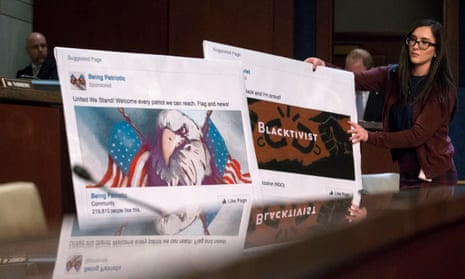The Observer’s remarkable exposé of Cambridge Analytica must now bring down the curtain on the permissive environment for online electoral sabotage. It’s time for new laws, starting with a new UK version of the Honest Ads Act proposed in Congress, so voters finally learn who is targeting them with what “news” – and who’s writing the cheques. And that’s the amendment I’ll propose to the data protection bill this week.
It’s not just the revelations about Cambridge Analytica that require us to act. The savagery in Salisbury brings with it a new truth. “Hybrid war”, fought for five years without mercy in the Ukraine, Crimea and the Baltics, has now arrived on our shores.
The definition of “hybrid war” is still moot. But scholars agree it entails damaging your enemy in ways that can be denied, with tactics as diverse as fielding troops without uniforms or launching crippling cyber attacks. The challenge is that this new battlefield is a rule-free zone. There’s no concept of “just war” to spell out when a response to an attack is legal. There are no Geneva conventions to define what is permissible behaviour.
But what is perhaps clear is that Russia’s hybrid battleplan doesn’t simply aspire to murder; it takes aim at the messiness of our digital democracy and seeks to divide us by stirring up as much hate speech on either side of an argument as possible. That’s why new rules for firms such as Cambridge Analytica and Facebook are so important. They enable this sort of foreign intervention to unfold. They are the critical links in what has become a tried and tested “dark social” playbook that is deployed with extraordinary effect.
First, we have the hackers, groups such as Fancy Bear and Cozy Bear, who were possibly among the teams leading the attacks on the Democratic National Committee during the US elections. They work in partnership with “useful idiots” like WikiLeaks, who were quite prepared to publish hacked material wholesale. Second, we have what’s most politely labelled the “alternative news platforms”, who publish to provoke a row. Once a row is up and running, the propagandists go to work on Twitter. Think of the misrepresented picture of a hijab-wearing lady on London Bridge during the terror attacks.
Once the ball is rolling, the troll farms go to work. We now know the importance of Twitter trolls and the organisations who run them such as the Kremlin’s Internet Research Agency. Russian “Twitter bots” or “active amplifiers” went into overdrive to spread anti-Macron and pro-Le Pen messages during the French election and these bots then shifted focus during September 2017 to attack Chancellor Angela Merkel and support far-right German candidates.

Fourth, inflammatory material is imported into private groups on Facebook, where it spreads with dizzying speed – and force. Of course we simply do not know the size of this impact. Why not? Because Facebook won’t tell us. Despite making nearly $4bn a quarter in profits, it claims it can’t track down problematic accounts.
Fifth, we now know there is a risk of foreign money being used to fund “dark social ads” with incredible reach on the internet. This tactic leverages an unholy alliance with extreme groups on the left and right. Its aim is to polarise and divide. If we look at the 45 new parties that have been created in Europe over the past 10 to 20 years, we see a clear majority that have some sympathy with Russia. They include Germany’s AFD, Austria’s FPO, the Golden Dawn in Greece, Jobbik in Hungary, the Front National in France, the Northern League in Italy and, indeed, Ukip. The Front National took huge secret loans from Kremlin-backed banks. Nigel Farage famously said that Vladimir Putin was the leader he most admired.
Today, our legislation, agencies and national strategy are not fit for purpose. Social media giants enjoy a legal privilege invented before they were born, which lets them operate as platforms, not publishers. That means Facebook, YouTube or Twitter can avoid liabilities that newspapers face if they became message carriers for hate speech or death threats. The Electoral Commission is powerless to police foreign interference. The Advertising Standards Authority is reluctant to regulate political advertising: it has the power to ban political adverts from broadcast but not from targeted social media campaigns.
The lunacy of our current position is summarised by a simple fact. The US Congress currently has more power to investigate and act on this threat than we have here in this country. Section 256 of the Sanctions Act 2017 requires Congress to seek from the president an annual report into Russian interference into the elections and referendums of US allies such as our good selves.
This week, Labour will take steps to bring our laws into the era of hybrid warfare, with amendments to the data protection bill that set a deadline for updating the eCommerce directive. We would also, crucially, equip the Electoral Commission with powers to serve a “targeted disclosure notice”, which can be served on anyone suspected of trying to influence an election – or indeed a referendum – to set out what they’re spending where, and who they are targeting. It’s a British version of the American idea for an Honest Ads Act, requiring disclosure of who is spending what online, in pursuit of the basic right of voters to be fully informed.
Ultimately, as in any battle, our values and traditions are at stake. Our democracy and our traditions of free speech are priceless. Let’s make sure we’ve got the laws to defend them.
